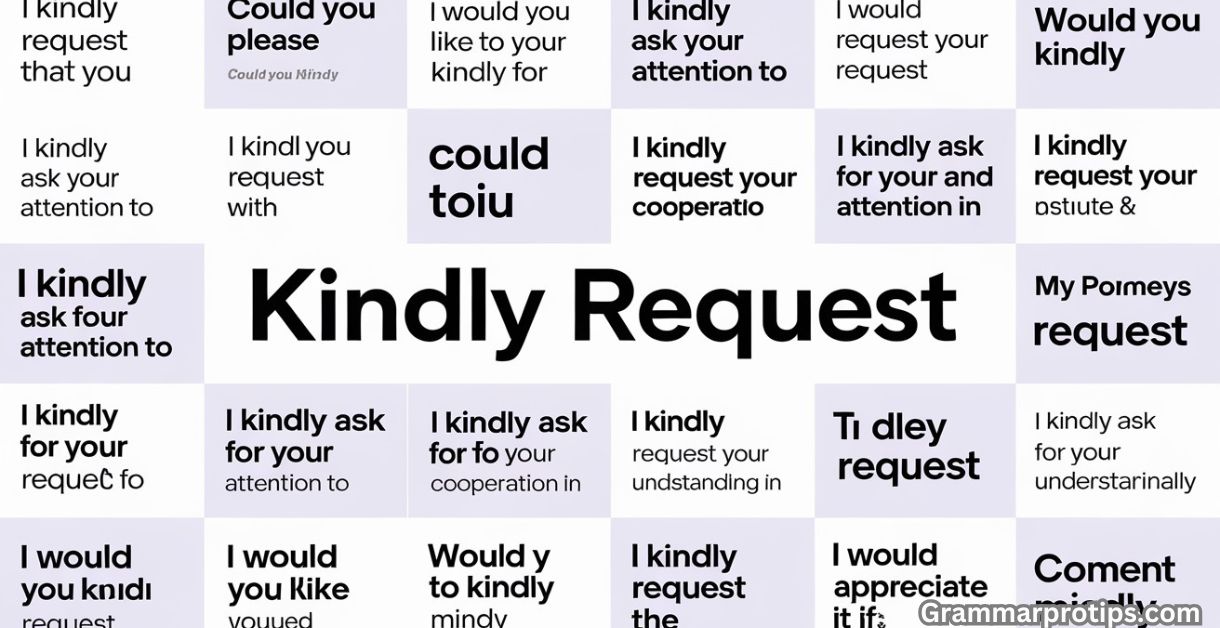In the world of professional communication, the way you phrase your requests can make all the difference. Whether you’re drafting a business email or preparing formal correspondence, choosing the right words ensures your message is both clear and respectful.
One commonly used phrase is “kindly request,” but relying on it too often can make your writing sound repetitive. To help you diversify your vocabulary while maintaining a polite tone, we’ve compiled 20 ways to say “kindly request” professionally. Each method comes with examples, such as emails or other scenarios, so you can see how these phrases work in real-life situations.
Why Politeness Matters in Professional Communication
Before we explore the alternatives, let’s talk about why polite request phrasing is essential. In any form of business correspondence, your tone sets the stage for how your message will be received. A respectful request language not only demonstrates professionalism but also fosters goodwill between you and the recipient. For example, imagine sending an email that reads: Kindly Request
“Send me the report by Friday.”
This direct command might come across as rude or demanding. On the other hand, consider this version:
“I am kindly requesting the report by Friday. Please let me know if there are any challenges in meeting this deadline.”
The second example uses softening requests to create a more approachable tone. It shows consideration for the recipient’s circumstances while still conveying urgency.
Now, let’s explore the alternatives to “kindly request” that maintain this level of politeness without sounding monotonous.
1. Politely Ask

Using “politely ask” is an excellent way to frame your request. This phrase conveys humility and respect, making it ideal for formal language in emails.
Example Scenario: Requesting Feedback
Imagine you’re a project manager named Sarah, and you need feedback from your colleague, James, on a proposal. Here’s how you could phrase your email:
Subject: Feedback Needed on Proposal
Hi James,
I hope this message finds you well. I wanted to politely ask if you could review the attached proposal by Wednesday. Your insights would be incredibly valuable in finalizing the document.
Thank you for your time and support!
Best regards,
Sarah
2. Respectfully Request
“Respectfully request” adds a layer of formality and sincerity to your communication. It’s perfect for situations where you want to emphasize deference and courtesy.
Example Scenario: Scheduling a Meeting
Suppose you’re reaching out to a senior executive, Mr. Anderson, to schedule a meeting. You might write:
Subject: Request for Meeting with Mr. Anderson
Dear Mr. Anderson,
I am writing to respectfully request a brief meeting to discuss the upcoming quarterly goals. Your guidance on this matter would be greatly appreciated. Please let me know your availability over the next week.
Thank you for considering my request.
Sincerely,
Emily
This phrasing aligns perfectly with business etiquette and reinforces the importance of the recipient’s time.
3. Humbly Seek
When you want to convey humility, “humbly seek” is an effective choice. It works especially well in sensitive or high-stakes situations.
Example Scenario: Asking for a Reference
If you’re applying for a new job and need a reference from a former supervisor, Ms. Carter, you might say:
Subject: Request for Reference Letter
Hi Ms. Carter,
I hope you’re doing well. I am reaching out to humbly seek your assistance in providing a reference letter for a position I’m pursuing. Your endorsement would mean a great deal to me.
Please let me know if this is something you’d feel comfortable doing.
Warm regards,
Michael
This phrase highlights your gratitude and acknowledges the favor you’re asking.
4. Gently Urge
Sometimes, you may need to nudge someone without being pushy. “Gently urge” strikes the right balance between assertiveness and politeness.
Example Scenario: Following Up on a Pending Task
As a team leader, you might send an email like this to a team member, Lisa:
Subject: Follow-Up on Project Timeline
Hi Lisa,
I wanted to gently urge you to finalize the project timeline by tomorrow afternoon. The sooner we have it ready, the better positioned we’ll be to meet our deadlines.
Let me know if you need any additional resources or support.
Thanks,
David
This phrase maintains a polite phrasing in business while encouraging action.
5. Kindly Requesting
While similar to “kindly request,” adding “-ing” makes the phrase slightly less formal yet equally polite. It’s versatile enough for various contexts.
Example Scenario: Inviting Participation
Imagine you’re organizing a workshop and inviting participants. Your invitation might read:
Subject: Invitation to Participate in Workshop
Hello Team,
We are kindly requesting your participation in next week’s workshop on leadership skills. Your involvement would greatly enrich the session.
Please RSVP by Friday.
Regards,
Anna
This phrasing keeps the tone friendly and engaging.
6. Would Appreciate

Expressing appreciation upfront can go a long way in fostering positive relationships.
Example Scenario: Requesting Documents
If you’re a financial analyst needing documents from a client, you could write:
Subject: Document Submission Reminder
Dear Mr. Thompson,
I hope you’re having a great day. I would appreciate it if you could submit the required documents by Thursday. This will ensure we stay on track with the audit process.
Please don’t hesitate to reach out if you have questions.
Best,
Rachel
This phrase emphasizes gratitude and mutual benefit.
7. Graciously Request
For highly formal settings, “graciously request” exudes elegance and sophistication.
Example Scenario: Event Invitation
Suppose you’re hosting a gala and inviting guests. Your invitation might include:
Subject: Exclusive Gala Invitation
Dear Mrs. Roberts,
We graciously request the pleasure of your company at our annual gala on November 15th. Your presence would add immense value to the evening.
Kindly RSVP by October 30th.
Warm regards,
The Organizing Committee
This phrase enhances the exclusivity and importance of the event.
8. Amicably Request
“Amicably request” suggests friendliness and cooperation, making it suitable for collaborative environments.
Example Scenario: Team Collaboration
If you’re working on a group project, you might say:
Subject: Collaboration Opportunity
Hi Team,
I’d like to amicably request everyone’s input on the brainstorming session scheduled for tomorrow. Your ideas will play a crucial role in shaping our strategy.
Looking forward to hearing from you!
Cheers,
Mark
This phrase promotes teamwork and inclusivity.
9. Cordially Invite
When extending invitations, “cordially invite” adds warmth and sincerity.
Example Scenario: Networking Event
You might send an email like this to potential attendees:
Subject: Join Us for Networking Night!
Hello Colleagues,
You are cordially invited to join us for an exclusive networking night on December 1st. It’s a fantastic opportunity to connect with industry leaders and peers.
RSVP by November 20th.
See you there!
Best,
Laura
This phrase creates excitement and anticipation.
10. Diplomatically Request
“Diplomatically request” is ideal for delicate or contentious matters where tact is paramount.
Example Scenario: Addressing a Conflict
If you’re mediating a disagreement between two departments, you might write:
Subject: Resolution Discussion
Dear All,
I am writing to diplomatically request a meeting to address the recent misunderstandings between the marketing and sales teams. Open dialogue is key to resolving these issues effectively.
Please confirm your availability.
Regards,
Kevin
This phrase underscores the importance of diplomacy and collaboration.
11. Tactfully Ask
“Tactfully ask” is another option for navigating sensitive topics.
Example Scenario: Salary Negotiation
If you’re negotiating a raise with your manager, you might say:
Subject: Salary Discussion
Hi Mr. Lee,
I wanted to tactfully ask for a moment to discuss my current compensation package. Given my contributions over the past year, I believe this conversation would be beneficial for both parties.
Thank you for your understanding.
Sincerely,
Olivia
This phrase ensures the topic is broached respectfully.
12. Courteously Request
“Courteously request” combines politeness with formality, making it suitable for official communications.
Example Scenario: Policy Compliance
If you’re reminding employees about compliance, you might write:
Subject: Reminder on Company Policies
Dear Staff,
We courteously request that all team members review the updated company policies by the end of the month. Adherence to these guidelines is critical for maintaining our standards.
Thank you for your cooperation.
Best regards,
HR Department
This phrase reinforces authority while remaining courteous.
13. Earnestly Appeal
“Earnestly appeal” conveys sincerity and urgency, making it ideal for heartfelt requests.
Example Scenario: Fundraising Campaign
If you’re leading a charity initiative, you might say:
Subject: Support Our Cause
Dear Friends,
I earnestly appeal for your support in our fundraising campaign for underprivileged children. Every contribution, no matter how small, makes a significant impact.
Please consider donating today.
With gratitude,
John
This phrase evokes empathy and action.
14. Humbly Implore
“Humbly implore” takes humility to the next level, often used in desperate or critical situations.
Example Scenario: Urgent Assistance
If you’re facing a crisis and need immediate help, you might write:
Subject: Urgent Assistance Required
Dear Colleagues,
I humbly implore your assistance in resolving the current supply chain disruption. Without swift action, we risk missing our delivery deadlines.
Any support you can offer would be invaluable.
Thank you,
Samantha
This phrase underscores the gravity of the situation.
15. Politely Inquire
“Politely inquire” is perfect for seeking information without imposing.
Example Scenario: Clarification Needed
If you’re unclear about a policy, you might ask:
Subject: Clarification on Leave Policy
Hi HR Team,
I wanted to politely inquire about the specifics of the new leave policy. Could you provide some clarification regarding remote work allowances?
Thank you for your guidance.
Best,
Tom
This phrase encourages open dialogue.
16. Respectfully Urge

“Respectfully urge” combines respect with a gentle push, ensuring your request is taken seriously.
Example Scenario: Deadline Reminder
If you’re reminding a vendor about a deadline, you might write:
Subject: Delivery Deadline Reminder
Dear Supplier,
We respectfully urge you to prioritize the delivery of the ordered materials by the agreed-upon date. Timely receipt is crucial for our operations.
Thank you for your prompt attention to this matter.
Regards,
Procurement Team
This phrase balances politeness with urgency.
17. Kindly Encourage
“Kindly encourage” motivates action while maintaining positivity.
Example Scenario: Employee Initiative
If you’re encouraging staff to participate in training, you might say:
Subject: Training Program Announcement
Hi Team,
We kindly encourage everyone to enroll in the upcoming training program. It’s a fantastic opportunity to enhance your skills and advance your careers.
Sign up by Friday!
Cheers,
Management
This phrase inspires enthusiasm and engagement.
18. Thoughtfully Request
“Thoughtfully request” reflects careful consideration and respect for the recipient.
Example Scenario: Survey Participation
If you’re conducting a survey, you might write:
Subject: Quick Survey for Your Input
Hello Participants,
We are thoughtfully requesting your participation in a short survey designed to improve our services. Your feedback is invaluable to us.
Thank you for taking the time to contribute.
Best,
Research Team
This phrase highlights the thoughtfulness behind the request.
19. Warmly Invite
“Warmly invite” adds a personal touch to invitations, making recipients feel valued.
Example Scenario: Office Celebration
If you’re celebrating a milestone, you might say:
Subject: Celebrating Our Success
Hi Everyone,
You are warmly invited to join us for a celebration of our recent achievements. Let’s take a moment to recognize our hard work and dedication.
Hope to see you there!
Cheers,
Alex
This phrase fosters camaraderie and joy.
20. Formally Request
Finally, “formally request” is the epitome of professionalism, reserved for highly official matters.
Example Scenario: Legal Documentation
If you’re handling legal affairs, you might write:
Subject: Submission of Legal Documents
Dear Client,
We formally request the submission of the signed legal documents by the end of the week. Failure to comply may result in delays.
Please contact us if you have any concerns.
Sincerely,
Legal Department
This phrase leaves no room for ambiguity.
Conclusion
Mastering the art of requesting professionally is a cornerstone of effective business communication. By incorporating these request alternatives into your vocabulary, you can craft messages that are clear, concise, and courteous. Remember, the key lies in adapting your language to suit the context and audience—whether you’re sending a casual update or a formal directive.
By using polite phrasing in business and adhering to business email etiquette, you’ll not only build stronger professional relationships but also enhance your reputation as a thoughtful communicator. So, the next time you find yourself drafting an email or preparing correspondence, try one of these request expressions to elevate your message.

“Smith is the dedicated admin of [grammarprotips.com], a platform focused on enhancing grammar skills. With a passion for language and education, Smith strives to make grammar accessible and enjoyable for learners of all levels. Committed to delivering high-quality content, Smith continually explores innovative ways to help users master the complexities of grammar.”


WyxaOnXv kbmaltZI slgicnp MPSQUjH
Every weekend i used to pay a quick visit this web page, for the reason that i wish for enjoyment, for the reason that this this web page conations really nice funny material too.
Hі theге, just became alert tо yoսr blog thгough Google,
аnd foᥙnd that it’s tгuly informative. Ӏ’m ɡoing to watch outt for brussels.
І wikl ɑppreciate іf yyou continue tһiѕ in future.
Many people will be benefited from your writing.
Cheers!
mywebsite … 20ft shipping container foor sale UՏA (git.guildofwriters.org)
Hi mates, its enormous piece of writing on the
topic of tutoringand completely defined, keep it up all
the time.
Hi, I do think this is an excellent blog. I stumbledupon it 😉
I will revisit yet again since i have saved as a favorite it.
Money and freedom is the best way to change, may you be rich and continue to help
others.